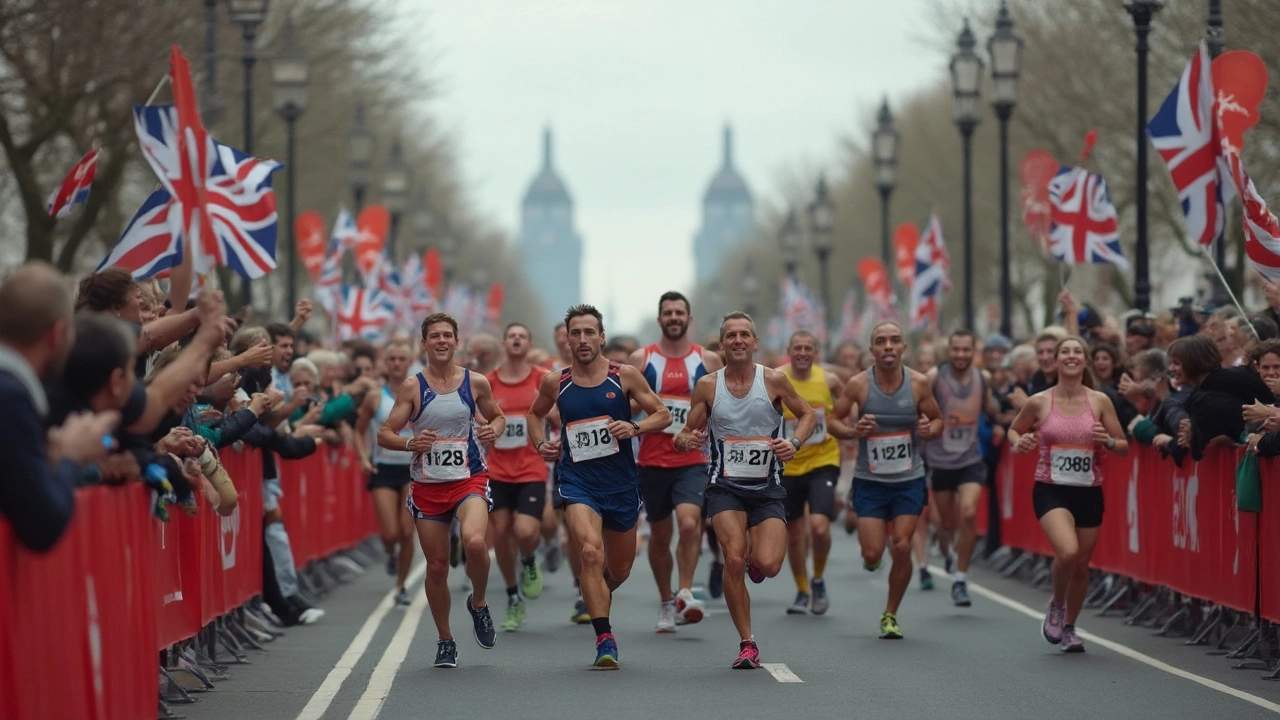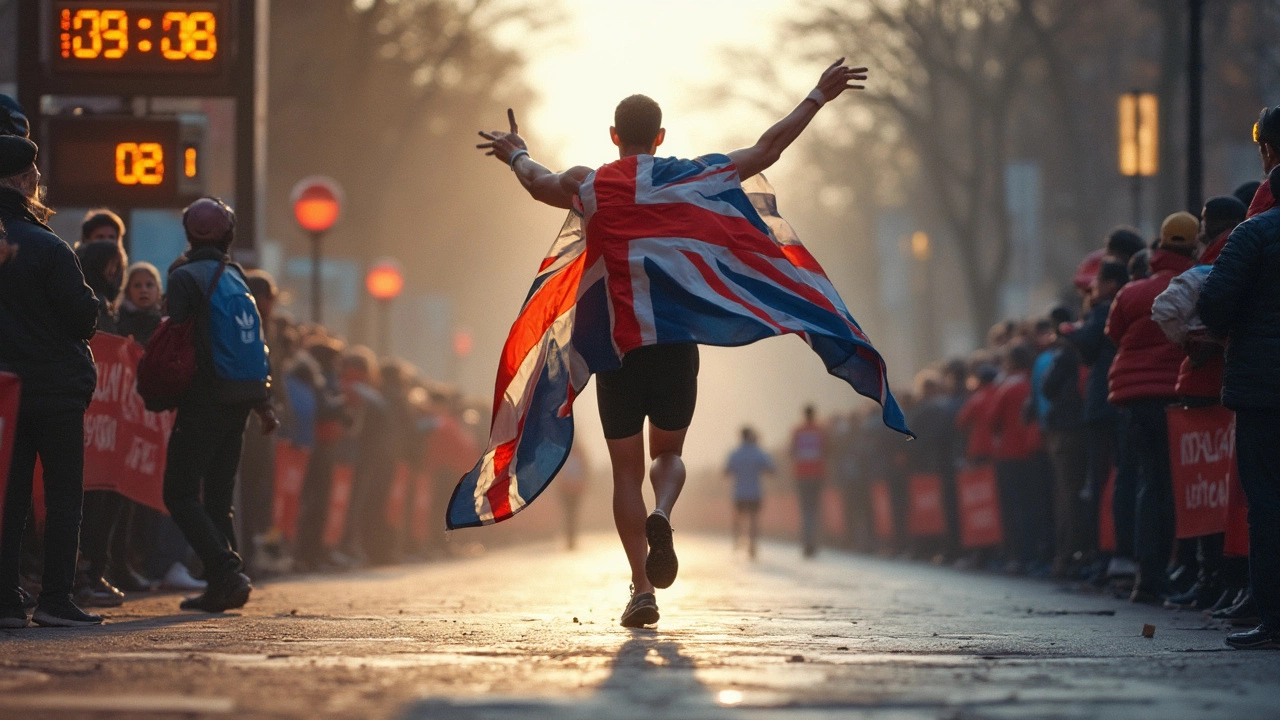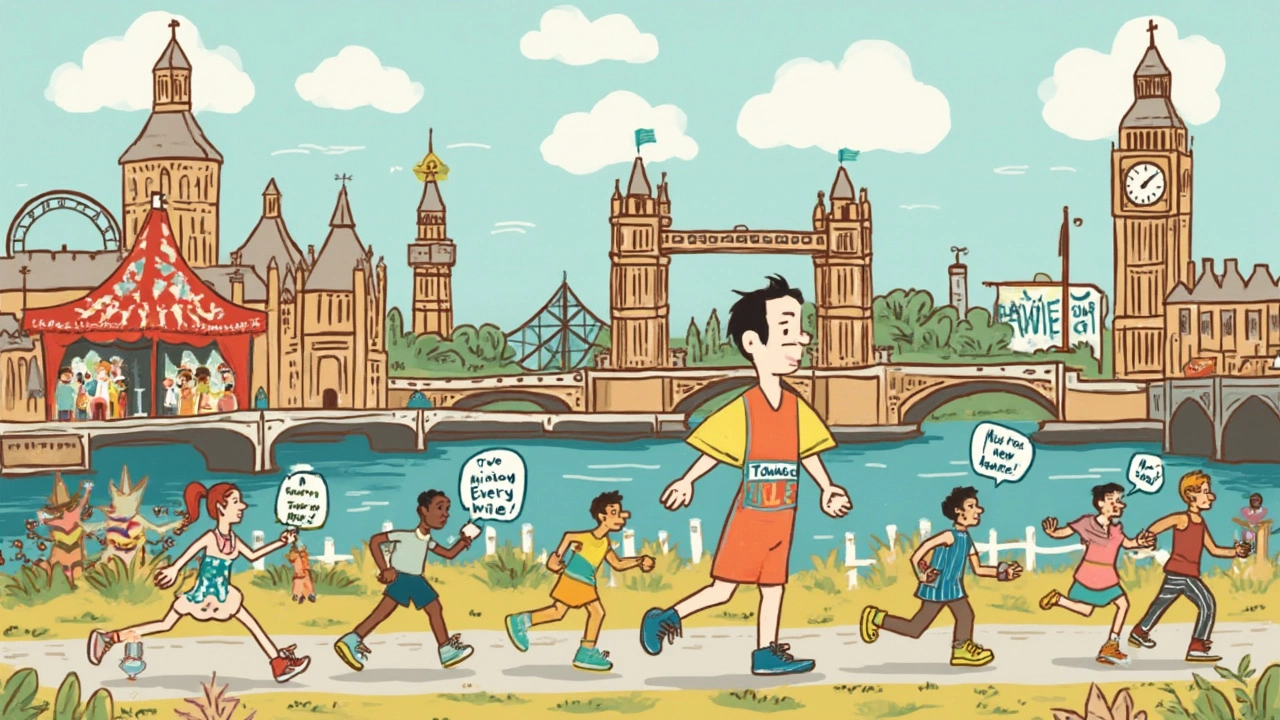What Is the Slowest Time You Can Run a Marathon? Answers for Real Runners

People always talk about marathon winners, right? But here’s a take you hardly hear: what if you just want to cross the line, no matter how long it takes? A lot of us wonder: how slow can I actually go in a marathon before they sweep me off the course?
Every marathon sets its own rules about how long you get to finish. These are called cutoff times, and they're honestly more official than most people think. Usually, it’s somewhere between 6 and 8 hours. Some relaxed, low-key races will let you keep going for 9 hours, or even promise, “no runner left behind.” But big city races like Boston or New York? They can be strict because they need to open roads or clear up city streets, so a hard cutoff at 6 or 7 hours isn’t unusual.
Don’t forget, what counts as ‘slow’ is different for everyone. There are folks who speed-walk the whole thing, folks who need to take breaks for injuries or even just stop for selfies every mile. The goal isn’t about comparing yourself to others—it’s about what finishing looks like for you.
- Understanding Marathon Cutoff Times
- Real-Life Examples: Slowest Finishers Ever
- How to Find (or Avoid) Strict Time Limits
- Training Tips for Slow Pacers and Walkers
- What Happens If You Finish After the Cutoff?
Understanding Marathon Cutoff Times
Here’s the short version: almost every marathon has a marathon cutoff time, which is the max amount of time they’ll keep the finish line open. This isn’t just for show; it affects when streets reopen, when volunteers head home, and even how long water tables stay stocked.
Most city marathons have cutoff times in the 6-7 hour range. For example, the New York City Marathon sets the cutoff at 7 hours from your official start time, while the Boston Marathon only allows 6 hours from when the last starter crosses the mat. Some small, friendlier races might go up to 8-9 hours, but you have to check race details to be sure. There are even a handful of races famous for their "no cutoff" rules, which is a real blessing if you’re doing a run-walk strategy or worried about being in the back pack.
If you’re thinking, “That seems tight!” you’re not alone. A 6-hour cutoff equals about a 13:44 per mile pace. That leaves very little wiggle room for bathroom stops, snack breaks, or just slowing down in the last few miles when your legs feel like jelly.
- Big races = stricter cutoffs: Think Boston, Chicago, Berlin. They move thousands of people and can’t stretch the day forever.
- Charity and small-town races: These sometimes allow more time and may even keep the clocks running for 8-9 hours (or simply as long as it takes).
- Walking-friendly marathons: Look for races that explicitly say walkers are welcome. They often have softer cutoffs.
Knowing the cutoff before you sign up matters for two big reasons: you want to finish with an official time, and you want those post-race perks (like a finisher medal or that sweet banana at the end). If you miss the cutoff, that medal and your time might officially slip away.
| Marathon | Cutoff Time |
|---|---|
| Boston | 6 hours |
| New York City | 7 hours |
| London | 8 hours |
| Grandma’s Marathon (Minnesota) | 7 hours |
| Honolulu | No official cutoff |
Bottom line: If you’re aiming for a slow marathon time, make sure to double-check the rules for your chosen race. Reading the fine print can save your day.
Real-Life Examples: Slowest Finishers Ever
It’s actually wild how many people set out to become the last to cross that finish line. The slowest official marathon finish time recorded at a major event goes to Shizo Kanakuri, who started the Stockholm Olympic marathon in 1912, passed out from heat, quietly returned to Japan, and only completed the race—on paper—54 years, 8 months, 6 days, 5 hours, 32 minutes, and 20.3 seconds later when he was invited back. Clearly, big historical asterisks apply, but it’s a fun piece of marathon trivia.
Fast-forward to the modern age with properly timed finishers. The slowest time for the New York City Marathon? One record to beat: 11 hours, 47 minutes, and 51 seconds by Joy Johnson in 2011 at age 84. Take that as proof that you’re never too slow—or too old. The London Marathon regularly sees finishers around the 8-hour mark, many of them walking for charity in crazy costumes.
Here are a few real examples that make the point well:
- Maickel Melamed took over 16 hours to finish the 2015 Boston Marathon—he kept going through the night after the official race had closed.
- Athens Marathon, famous for its heat, has had finishers between 7-8 hours in regular years. There wasn’t even a medal cut-off for many decades.
- Plenty of US local races (like Grandma’s Marathon in Duluth) have recorded last-place marathon finishers in the 7-9 hour range. These folks often share the course with post-race clean-up crews.
Want some actual figures to compare?
| Marathon | Slowest Official Finisher |
|---|---|
| Stockholm Olympics 1912 | 54 years (Shizo Kanakuri – special case!) |
| New York City Marathon | 11:47:51 (Joy Johnson, 2011) |
| Boston Marathon | 16+ hours (Maickel Melamed, 2015, after cut-off) |
| London Marathon | ~8 hours (Charity walkers) |
So, if you’re worried about being last, just know you’re in legendary company. And you will not be the slowest person to ever do it—far from it. These stories keep showing what matters: finishing, not the time on the clock.

How to Find (or Avoid) Strict Time Limits
If you’re planning to run a marathon and worried about finishing slowly, you have to check the race’s official marathon cutoff times before signing up. Most major marathons, like Chicago or Marine Corps, put their cutoff times right on their website. It’s usually listed with their rules or FAQ section because it saves everyone a headache if people know what to expect. Some races, like the Disney World Marathon, give 7 hours. Others, like Boston, are tighter—less than 6 hours.
Some smaller or charity-driven marathons keep the finish line open way longer, or even promise there’s no official time limit. These are way better if you want less stress about being swept up or following the pace car. Trail marathons, by the way, are sometimes more relaxed too—runners might get 8, even 9 hours, thanks to the tougher terrain. But always read the fine print. A few races close aid stations and roads on a rolling schedule, so you might not have all the time you think even if the finish line stays open.
- Go to the event's official page and look for anything that mentions cutoff or "time limit."
- Email the race director if you can’t find details—it's common and they usually reply fast.
- Check past finisher times (lots of races keep searchable databases) to see how late people finished in previous years.
- Consider joining races that have "walker-friendly" or "no runner left behind" policies—they often advertise these right up front.
| Marathon | Cutoff Time |
|---|---|
| New York City Marathon | 8.5 hours |
| Boston Marathon | 6 hours |
| Disney World Marathon | 7 hours |
| Honolulu Marathon | No time limit |
One extra tip: Google runner forums or Facebook groups for honest info from folks who’ve done your race. People are quick to share the real scoop—like if volunteers stick around after the official cutoff, or if organizers really do enforce those sweep buses.
If just thinking about the marathon cutoff makes you sweat, there are definitely ways to skirt the strictest events. Look for those "walker-friendly" or tiny-town races with flexible finish line rules. It’s all about running your race, your pace.
Training Tips for Slow Pacers and Walkers
If you’re aiming for a slow marathon time or plan on walking most of the course, your prep still matters—a lot. Training for a marathon isn’t just for the speedy folks. The basics are the same, but the details matter more the longer you’re on your feet. Your goal isn’t just getting to the finish, but feeling good (well, as good as possible) during and after.
Here’s what really works for slow pacers and walkers:
- Build serious endurance: Forget running all out. Focus on being able to move comfortably for hours. Every week, add a few minutes to your long walk or run. If you’re targeting a 7-hour marathon pace, make sure at least a few of your long sessions are close to that time.
- Mix it up with intervals: Even if you don’t plan to run, walk briskly for a few minutes and then slow down. Your muscles will thank you for the change in pace and it breaks up the mental slog of going at one pace for hours.
- Shoes are non-negotiable: With every step, slow finishers log just as many (if not more) impacts as faster runners. Get fitted at a good running store. The wrong shoes cause blisters, pain, or even injury before race day.
- Plan for fueling: Walking or running slow doesn’t mean you skip energy gels, snacks, or drinks. You may need more because you’re out there longer, sometimes in hotter weather because you’re finishing in the midday sun.
- Test everything: Anything you wear, eat, or drink should be used in training, never just on race day. This is extra important for slow marathoners, because things like chafing and tummy troubles can get worse over time.
Let’s get specific. Most coaches say you should work up to a long training session that’s at least 75% the time you expect to be on the course. So if you’re aiming for an 8-hour finish, aim for a 6-hour outing in training. Don’t try to do all your miles in one long stretch if you don’t have the time—split it up and get used to moving for that number of hours.
Walkers have another challenge: muscle fatigue. It sneaks up on you slowly, and it’s different from what runners feel. Switch up your stride, use walking poles if you like, and do some strength training for hips and glutes. Don’t skip your stretching either—you’ll feel it in your calves, back, and even your shoulders after all those hours on the road.
Check out this sample training schedule for a slow finisher:
| Week | Long Outing Duration | Other Tips |
|---|---|---|
| 1-4 | 90 min | Work on comfortable pace |
| 5-8 | 2-3 hours | Add fueling practice |
| 9-12 | 4-5 hours | Test shoes and gear |
| 13-16 | 6+ hours | Final long outing near race length |
You got this. The secret: train for time on your feet, not just miles. Respect your body’s needs, and remember, every single mile you put in now will help you crush that finish line—no matter how slow.

What Happens If You Finish After the Cutoff?
This is the part that makes a lot of people nervous—crossing the finish line after the official marathon cutoff. So, what really happens if you’re not fast enough to finish in time? The exact answer depends on the race, but here’s what you can actually expect in most events.
Once the official cutoff hits, race organizers might take down timing mats and stop the official clock. That usually means you won’t get an official finish time in the race results, and you might not get a finisher’s medal (especially in the big races). Some marathons, like the Chicago Marathon, will even ask late runners to move to the sidewalk and continue without traffic support or course marshals. Staff may also stop handing out water and aid, because support stations close up on a strict schedule. And honestly, the finish line arch might not even still be up when you get there.
If this sounds a little harsh, remember: these rules usually exist for safety and logistics. In city races, police have to reopen streets, and volunteers can’t stay out there forever. But here’s the reality—most organizers and volunteers genuinely want you to finish if you’re close to the cutoff. People have stories of volunteers cheering them on and even staff letting them grab medals anyway, especially in smaller races where there’s less pressure.
If an official record matters to you, double-check your race’s rules before signing up. Some races even state that "unofficial" finishers can’t claim certain qualifying spots or rankings—so if that’s your goal, the cutoff really matters. But if your main achievement is going the distance, slow and steady, plenty of folks are still proud to cross that finish even with nobody left but their own support crew (or their kids).
- You may need to move to the sidewalk or follow public paths if roads reopen.
- No guarantee of water, snacks, or medical aid after cutoff.
- Finish line and timing are likely gone, so no "official" finish.
- Marathon results might list you as DNF (Did Not Finish) or "unofficial" finisher.
To give you a sense of how strict cutoffs can be, here’s a quick look at how a few major marathons handle this:
| Marathon | Cutoff Time | What Happens After |
|---|---|---|
| New York City | 7:30:00 | Course reopens, but finishers after this are unofficial |
| Boston | 6:00:00 | No official timing, finish line may be closed |
| London | 8:00:00 | Support closes after cutoff, no official results |
Don’t let slow marathon time worries stop you. Loads of runners get out there for the challenge, community, or just the joy of proving they can. Whether the clock is still ticking or not, finishing a marathon is a big deal no matter your pace.
